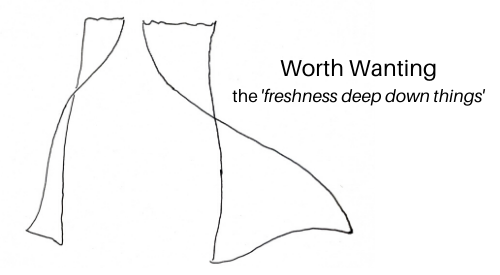
One of the reasons we love play is that it takes orders only from itself. Make-believe and world-building and all the multiplicity of games we take delight in arise from the impulse to play, and are answerable only to that imperative. Play is an autonomous zone of effortless exertion, of rapt joy, unconstrained by the need to produce any particular predetermined result, or any specific outcome at all.
That freedom is often brought (oh, maddening!) to heel by the interruptions of non-play world and its urgencies–work to do, duties to perform–and relentless immediacy, but play expresses itself again at a moment’s loosening of the leash.
Indeed the spirit of play, playfulness, can infect, as it were, the very serious business of the world and invest it with a lightness and largeness that balances its often dour and disenchanted dedication. Playfulness approaches the constraints of the world not with resignation, but as if freely chosen. Indeed by spontaneously inventing new worlds with new rules, and inhabiting them imaginatively, and changing them if and when we want, we gently mock the solemn laws with their inevitabilities and irrevocabilities that constrain us in our day-to-day laboring lives. There’s no bitterness in play.
Playfulness is inherent in all creativity, all conjecture, all critical appreciation. Playfulness can be careful, grave and sustained, or carefree, hilarious and impulsive. It can issue in something as concrete as a sculpture or as ephemeral as a dance.
An occasion of play treats the ‘real world’ as an other, and in so doing, it may be an encounter, provided it makes common cause with the livingness of the other. Encounter makes play not just affirmative, but transformative. All encounters are playful, but not all play is encounter.
Why do we so love play? Here’s my theory.
Play is about creating a penumbra of implications around one or a few simple facts or premises so as to constitute a whole world. An implication is something present or absent depending on the presence or absence of something else, a relationship analogous to that between symbol and meaning.
The spinning out of these implications, the weaving them one with another, the plucking of strands to see connections and feel the global resonance, the dash from concrete to speculative, then back, then out again is the exhilaration of play. As the play progresses, that world becomes thicker and richer with layered and intertwined implications.
Any such world of implications we make is, we sense, has meaning (overall) and meanings enfolded in its density mat of implications. Finding meaning is a process of unfolding. Artistry enfolds, game playing unfolds, but play pervades both.
Consider the matter this way:
In the first and most concrete level of play, let’s say a clapping game where the next move is prescribed, the penumbra of implications is related to the relationships of the participants associated with the ritual.
In the second level of play, hide and seek for instance, the sites in the playground searched without success have implications for the remainder of the places which may shelter the playmates. We might call this the penumbra of adjacent possibilities based on a particular (in this case) location.
In the third level of play, a game with tactics for example, we search for the latent possibilities related to the outcome we want depending on positions of pieces, places to move, rules of movement, conditions of victory. A chess board at any moment has a penumbra of latent possibilities. Each move has implications for the shape of the penumbra itself.
In the fourth level of play, a dinner table conversation say, someone puts forward a proposition from which others freewheelingly draw conclusions and add associations associated with the category of the original prompt, sketching in a whole world’s worth of plausible implications.
In the fifth level of play, a nonsense poem by someone like Lewis Carroll, implausible implications are pile one on top of another to create a crazy alternative to the ‘real world’, delightful in the freedom of its implausibility and self-assurance.
Level by level, the strictures of the physical, social, historical, and logical are loosened, so that freedom be asserted and explored in all areas of our existence. Any play can involve any or all levels.
We play to build around the limitations and literalisms of this ‘real’ world we have to inhabit that thick and rich penumbra of implications that make where we live, and what we do, and who we are, meaningful.
